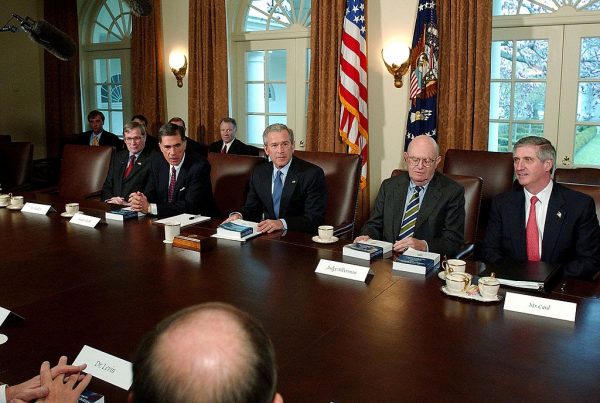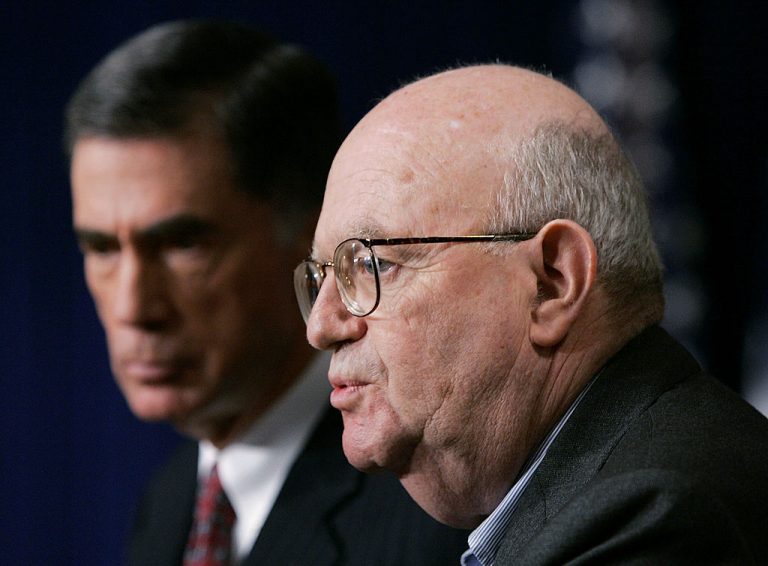A long-time federal appeals court judge appointed under the Regan administration sounded the alarm on the modern centralization and partisanship of big media in a dissenting opinion issued in a libel case on March 19.
The case Tah v. Global Witness Publishing Inc. revolved around a 2018 report by Global Witness, entitled “Catch Me If You Can: Exxon Complicit in Corrupt Liberian Oil Sector.” Global Witness, who describes itself as “challenging abuses of power to protect human rights and secure the future of our planet,” alleged that Exxon bribed Liberian officials through the National Oil Company of Liberia (NOCAL) to facilitate a deal for a plot of oil in the Atlantic Ocean dubbed Block 13.
The Report alleged that Christiana Tah, Liberia’s Minister of Justice, and Randolph McClain, NOCAL’s CEO were bribed by Exxon for their services in facilitating the deal, despite the fact that the payments were issued by the Liberian government, paid through the corporation, and all staff members, including the janitors, received a portion of the bonus, which ultimately resulted from Liberia collecting a sum 15 times greater than it had on any other deal in its history. Tah and McClain sued Global Witness for damages resulting from libel, were dismissed in Circuit Court, and again lost in the March 19 Judgment to an appellate panel.
Catch Me If You Can carried a disclaimer by its publisher, “Global Witness has no evidence that Exxon directed [the National Oil Company] to pay Liberian officials, nor that Exxon knew such payments were occurring.”
Two of the three most influential papers (at least historically), The New York Times and The Washington Post, are virtually Democratic Party broadsheets. And the news section of The Wall Street Journal leans in the same direction.
Success
You are now signed up for our newsletter
Success
Check your email to complete sign up
Federal Appeals Court Judge, Laurence Silberman, in his Dissent
In a 41-page ruling, divided approximately half and half between the ruling and the dissent, D.C. Circuit Court Judge Laurence Silberman argued a 1960s landmark Supreme Court case New York Times v. Sullivan, whose broad protection of media speech was used by the majority to dismiss the case, should be overturned by the Supreme Court. According to Silberman, the nature of New York Times “centered on a full-page advertisement soliciting donations for the civil rights movement and legal defense of Dr. Martin Luther King, Jr.”
“The advertisement claimed that civil rights proponents faced an ‘unprecedented wave of terror’ from ‘Southern violators’ denying constitutional guarantees to African Americans. It described ‘truckloads of police armed with shotguns and teargas’ that ‘ringed’ a college campus in Montgomery, Alabama. It further asserted that state authorities padlocked the dining hall ‘in an attempt to starve [the students] into submission.’ Various claims in the ad were inaccurate, and The Times eventually published a retraction.”

Silberman says Sullivan sued New York Times because, as Commissioner of Public Affairs, he supervised the police department. An Alabama jury awarded Sullivan $500,000 in damages in only a little over two hours of deliberation.
The Alabama Supreme Court upheld the decision, but it was overturned by the Supreme Court of the United States in a 9-0 ruling. Silberman explained the reason the high court issued Certiorari in the Sullivan case, “The point of these suits had less to do with repairing reputations and more to do with deterring the northern press from covering civil rights abuses. Southern officials, as Anthony Lewis succinctly explains, had thus twisted ‘the traditional libel action . . . into a state political weapon to intimidate the press’.”
Federal Appeals Court Judge sounds alarm on modern centralized press
Judge Silberman, in his dissent, advocates for the Supreme Court to overturn the legal precedent New York Times established in light of today’s realities, “Although the institutional press, it could be argued, needed that protection to cover the civil rights movement, that power is now abused. In light of today’s very different challenges, I doubt the Court would invent the same rule,” adding “it allows the press to cast false aspersions on public figures with near impunity.”
The Judge said, “It would be one thing if this were a two-sided phenomenon,” in which he referred to growing partisanship in the narratives published by the nation’s largest media outlets now, more than 50 years later, “the press more often manufactures scandals involving political conservatives.”
It should be borne in mind that the first step taken by any potential authoritarian or dictatorial regime is to gain control of communications, particularly the delivery of news. It is fair to conclude, therefore, that one-party control of the press and media is a threat to a viable democracy.
Federal Appeals Court Judge, Laurence Silberman, in his Dissent
“The increased power of the press is so dangerous today because we are very close to one-party control of these institutions,” said Silberman.
“Although the bias against the Republican Party—not just controversial individuals—is rather shocking today, this is not new; it is a long-term, secular trend going back at least to the ’70s.”
Judge Silberman pulled no punches in his judgment of the American establishment media, “Two of the three most influential papers (at least historically), The New York Times and The Washington Post, are virtually Democratic Party broadsheets. And the news section of The Wall Street Journal leans in the same direction.”
“The orientation of these three papers is followed by The Associated Press and most large papers across the country (such as the Los Angeles Times, Miami Herald, and Boston Globe). Nearly all television—network and cable—is a Democratic Party trumpet. Even the government-supported National Public Radio follows along.”
The judge also took aim at Big Tech, saying Silicon Valley “also has an enormous influence over the distribution of news. And it similarly filters news delivery in ways favorable to the Democratic Party,” citing how the New York Post’s pre-election Hunter Biden scandal was notoriously suppressed by Twitter at first, with fellow tech giants Facebook and Google following suit shortly thereafter.
Silberman said the matter is of political importance to the country, “There can be little question that the overwhelming uniformity of news bias in the United States has an enormous political impact.” He cited a 2011 book by Tim Groseclose, Professor of Economics at George Mason University, which found leaning media coverage “aiding Democratic Party candidates by 8–10% in the typical election.”
“And now, a decade after this book’s publication, the press and media do not even pretend to be neutral news services.”
Judge Silberman aired his concerns about the partisan control of media and its historical connection to the installation of autocracy, “It should be borne in mind that the first step taken by any potential authoritarian or dictatorial regime is to gain control of communications, particularly the delivery of news. It is fair to conclude, therefore, that one-party control of the press and media is a threat to a viable democracy.”
“It may even give rise to countervailing extremism. The First Amendment guarantees a free press to foster a vibrant trade in ideas. But a biased press can distort the marketplace. And when the media has proven its willingness—if not eagerness—to so distort, it is a profound mistake to stand by unjustified legal rules that serve only to enhance the press’ power.”
Follow us on Twitter or subscribe to our email list
















